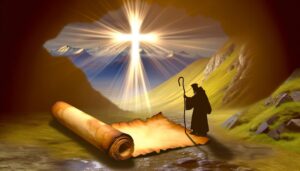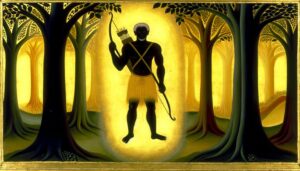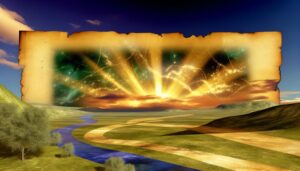Biblical Meaning of the Name Elimelech
Elimelech, derived from Hebrew, translates to 'My God is King,' combining 'Eli' (my God) and 'Melech' (king). This name encapsulates a profound theological assertion of divine sovereignty.
In the Old Covenant, Elimelech is a pivotal figure in the Book of Ruth, whose migration to Moab during a famine, followed by his and his sons' deaths, lays the groundwork for significant redemptive themes. His story reflects the interplay between human action and divine will, emphasizing God's authority in guiding life events.
Understanding Elimelech's name and narrative provides deeper insights into the theological fabric of biblical history.

Key Takeaways
- Elimelech means 'My God is King,' derived from Hebrew elements 'Eli' and 'Melech.'
- The name emphasizes God's sovereignty and divine authority.
- Elimelech's name reflects the theological theme of God's kingship within his story.
- His name signifies a deep connection to God's control over human affairs.
- Elimelech's narrative underscores the interplay between human decisions and divine will.
Etymology of Elimelech
The etymology of the name Elimelech, derived from the Hebrew elements 'Eli' meaning 'my God' and 'Melech' meaning 'king,' underscores a profound theological assertion that translates to 'My God is King.'
This nomenclature reflects the deeply ingrained monotheistic belief in the sovereignty of God within ancient Israelite culture. The combination of 'Eli' and 'Melech' is not merely a personal identifier but a declaration of divine rulership and fidelity to Yahweh, the God of Israel.
Understanding this etymology offers insight into the religious and cultural milieu of the time, wherein names were often imbued with significant spiritual meaning. It serves as a reflection of the theological consciousness that permeated everyday life in ancient Hebrew society.
Elimelech in the Old Testament
Elimelech, a figure in the Old Scriptures, is introduced as the husband of Naomi and the father of Mahlon and Chilion, marking the beginning of the Book of Ruth.
His decision to relocate his family to Moab amid a famine in Bethlehem sets the stage for the narrative's unfolding events, ultimately influencing the lineage of King David.
The name Elimelech, meaning 'My God is King,' encapsulates a theological assertion of divine sovereignty, even in the midst of personal and national crises.
Elimelech's Family Context
Nestled within the narrative of the Book of Ruth, Elimelech's family context provides a pivotal backdrop for understanding the theological and historical implications of his decisions and their ripple effects on subsequent biblical events. Elimelech, a man of Bethlehem in Judah, migrates to Moab due to famine, taking with him his wife, Naomi, and their two sons, Mahlon and Chilion.
Key elements of Elimelech's family context include:
- Migration to Moab: Reflects a significant decision driven by survival instincts and faith challenges.
- Marriage of Sons: Mahlon and Chilion marry Moabite women, Ruth and Orpah, showing cultural intersections.
- Family Tragedies: The deaths of Elimelech and his sons leave Naomi and her daughters-in-law in a vulnerable position, setting the stage for ensuing events.
Role in Ruth's Story
Elimelech's role in Ruth's story, though brief, serves as a catalyst for the unfolding narrative that intertwines themes of loyalty, providence, and redemption within the Old Scriptures. Historically, Elimelech's decision to move his family from Bethlehem to Moab during a famine set the stage for significant events. His subsequent death, along with the deaths of his sons Mahlon and Chilion, left Naomi, his widow, destitute and childless.
Theologically, his passing acts as a divine orchestration, pushing Naomi and Ruth, her Moabite daughter-in-law, to return to Bethlehem. This journey back to Bethlehem becomes the bedrock for Ruth's remarkable loyalty to Naomi, and ultimately, her marriage to Boaz—an event central to the lineage of King David and the Messianic prophecy.
Significance of His Name
In the Old Scripture, the name Elimelech, derived from Hebrew words meaning 'My God is King,' encapsulates a theological declaration of divine sovereignty and faith. This powerful name offers deep insights into the cultural and spiritual context of the Old Covenant:
- Divine Sovereignty: Elimelech's name underscores a belief in God's ultimate authority over the affairs of humanity.
- Faith Amid Adversity: Given Elimelech's life during a time of famine, his name reflects a profound trust in God's provision.
- Cultural Identity: The name reinforces the centrality of God in the identity and life of the Israelites, serving as a reminder of their covenant relationship.
Elimelech's name thus serves as a statement to enduring faith and theological conviction in the biblical narrative.
The Story of Elimelech
Amidst the historical and theological tapestry of the Book of Ruth, the story of Elimelech emerges as a pivotal narrative that sets the stage for the ensuing events in the biblical text.
Elimelech, whose name means 'My God is King,' makes the consequential decision to leave Bethlehem during a famine, seeking sustenance in the land of Moab. This migration reflects significant themes of faith and survival, highlighting the harsh socio-economic realities of the time.
Elimelech's death in Moab leaves his wife, Naomi, and their two sons in a foreign land, creating a crucible for themes of loyalty, providence, and redemption that resonate throughout the Book of Ruth. His story underscores the interplay between divine sovereignty and human agency.
Elimelech's Family Background
Elimelech's family background, rooted in the tribe of Judah, positions him within a significant ancestral lineage that impacts the broader biblical narrative.
His marriage to Naomi and their subsequent migration to Moab introduce pivotal themes of loyalty and divine providence.
Examining his lineage and familial relations provides deeper theological insights into the unfolding story of Ruth and the eventual genealogy of King David.
Ancestral Lineage of Elimelech
Rooted in the rich tapestry of Judaic history, Elimelech's lineage is intricately connected to the tribe of Judah, offering profound insights into his familial and theological significance. As a Bethlehemite, Elimelech traces his ancestry through notable Judaic figures, emphasizing his heritage's importance.
- Tribe of Judah: This tribe holds significant biblical prominence, being the lineage from which King David and ultimately, the Messiah, would emerge.
- Bethlehemite Heritage: Bethlehem's historical and prophetic relevance further underscores Elimelech's standing within Judaic tradition.
- Family Relations: Elimelech's connections to key biblical characters, such as his wife Naomi and his sons Mahlon and Chilion, highlight the interconnectedness of his ancestral roots to broader biblical narratives.
This lineage frames Elimelech within the context of Judaic theological and historical continuities.
Role in Biblical Narrative
Within the biblical narrative, Elimelech's journey from Bethlehem to Moab significantly influences the unfolding story of Ruth, facilitating themes of loyalty, redemption, and divine providence.
As a man from the tribe of Judah, Elimelech's decision to relocate his family during a famine underscores the dire circumstances faced by Israelites at the time. His migration to Moab, a region often depicted in scripture as foreign and adversarial, sets a critical stage for the story's theological developments.
Elimelech's death in Moab leaves his wife Naomi and their sons in a vulnerable state, catalyzing the events that lead to Ruth's eventual inclusion in the lineage of King David. Therefore, Elimelech's familial background is instrumental in shaping the narrative's exploration of God's overarching plan.
Relation to Naomi
Naomi, Elimelech's wife, emerges as a pivotal figure in the narrative, her experiences shedding light on the familial challenges and cultural dynamics of the period. Her relationship with Elimelech is deeply intertwined with the socio-religious fabric of ancient Israel. This connection is illustrated through:
- Migration to Moab: The family's relocation due to famine reflects the harsh economic realities and the faith-testing trials they faced.
- Loss and Widowhood: Naomi's sorrow following Elimelech's death underscores the vulnerability of women in patriarchal societies.
- Return to Bethlehem: Naomi's journey back home symbolizes hope and restoration within the covenant community.
Theologically, Naomi's story provides profound insights into God's providence and the enduring strength of familial bonds amidst adversity.
Elimelech's Journey to Moab
Elimelech's decision to relocate his family from Bethlehem to Moab amid a severe famine underscores a significant moment of desperation and survival in the biblical narrative.
Historically, the move reflects the dire conditions in Bethlehem, often referred to as the 'House of Bread,' which ironically faced scarcity. Moab, a region with a complicated relationship with Israel, offered a temporary refuge despite its pagan culture.
Theologically, this journey illustrates the struggle to find sustenance against divine testing, as famine in the Old Scriptures frequently signifies God's judgment or trials. Elimelech's choice, while pragmatic, introduces a complex interplay between faith and survival, setting the stage for the subsequent events in the Book of Ruth.
Theological Significance
Frequently, the theological significance of Elimelech's migration to Moab is examined through the lens of divine providence and the broader narrative of redemption in the Book of Ruth. This event is pivotal, providing a backdrop for key theological themes:
- Divine Sovereignty: Elimelech's decision to leave Bethlehem during famine illustrates God's overarching control, shaping events for future redemption.
- Human Agency: His choices highlight human responsibility and the consequences of actions within God's providential plan.
- Redemptive Purpose: Elimelech's journey sets the stage for Ruth's introduction, ultimately leading to the lineage of King David and the Messiah.
Analyzing these elements offers profound insights into how individual lives intertwine with divine plans, enriching our understanding of God's redemptive work throughout history.
Lessons From Elimelech's Life
Examining the life of Elimelech reveals critical lessons about faith, decision-making, and the intricate interplay between human actions and divine will within the historical and theological context of the Book of Ruth. Elimelech's decision to leave Bethlehem during famine and settle in Moab underscores the tension between human agency and trust in divine provision. His actions prompt reflection on the consequences of seeking solutions outside of God's covenantal promises.
| Aspect | Elimelech's Life | Lesson |
|---|---|---|
| Faith | Left Bethlehem | Trust in God's provision |
| Decision-Making | Moved to Moab | Consider faith-based choices |
| Consequences | Family hardships in Moab | Implications of straying from faith |
| Divine Will | Return to Bethlehem | Realignment with God's plan |
This narrative invites believers to reflect deeply on their faith and decisions.
Elimelech's Legacy
The legacy of Elimelech extends beyond his immediate decisions, embedding itself within the broader narrative of redemption and divine orchestration in the Book of Ruth. His choices set the stage for significant events that underscore God's providential care:
- Migration to Moab: Elimelech's move to Moab, driven by famine, initiated a sequence of events that led to Ruth's integration into Israelite society.
- Marriage and Loss: His sons' marriages to Moabite women, followed by their untimely deaths, positioned Naomi and Ruth to return to Bethlehem, catalyzing the story's redemptive arc.
- Lineage of David: Ruth's subsequent marriage to Boaz, a direct consequence of Elimelech's earlier decisions, ultimately contributed to the Davidic lineage, highlighting themes of loyalty and divine sovereignty.
Conclusion
The name Elimelech, meaning 'My God is King,' offers a poignant irony when juxtaposed with his life narrative. Despite the divine connotation, Elimelech's journey from Bethlehem to Moab amid famine and his subsequent death underscore a paradox of faith and survival.
His story, a microcosm of human frailty and divine sovereignty, serves as a theological reflection on trust in divine providence, even when circumstances appear to contradict the very essence of his name.






